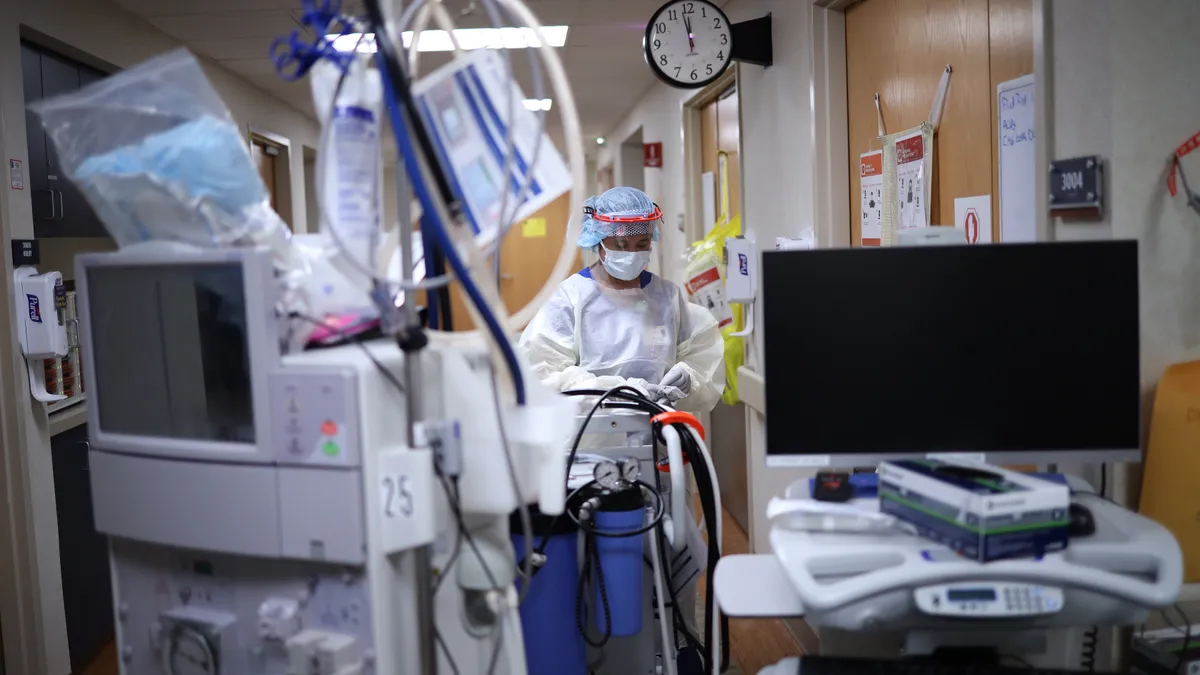Robust sales of robotic surgery systems helped orthopaedic device makers weather the omicron variant's negative impact on elective procedures in the fourth quarter, with Zimmer Biomet, Stryker and Johnson & Johnson each reporting strong demand for their platforms.
The orthopaedic sector has struggled with flagging sales of device implants throughout the COVID-19 pandemic as hospitals postponed nonemergency procedures such as hip and knee replacements, and the spike in omicron cases in late 2021 again weighed on results in the latest quarter.
Zimmer's shares closed down more than 9% on Monday as results missed Wall Street expectations. Analysts attributed the selloff to the company's especially gloomy 2022 outlook, with CEO Bryan Hanson projecting that COVID-19 pressure will be ongoing throughout the year.
That outlook contrasted with other medtech companies' forecasts for a diminishing COVID-19 impact in 2022, SVB Leerink analysts said in a note to clients.
"This different approach could in part be due to the fact that 80% of their sales are tied to elective procedures, but it could also be tied to what we view as prudent conservatism given the ongoing uncertainties around not just COVID but hospital staffing shortages," SVB Leerink said.
Following Monday's drop, Zimmer's stock was up over 5.5% when the market opened Tuesday.
All three orthopaedic device makers pointed to hospital staffing shortages as a contributing factor constraining elective procedures in the fourth quarter. Both patients and hospital staff members diagnosed with or exposed to someone with COVID-19 canceled procedures as omicron cases surged toward the end of the quarter, Zimmer's Hanson said. Stryker revealed that nursing staff shortages contributed to difficulties in scheduling procedures, leading to reduced volumes.
"We expect hospital staffing shortages, supply constraints and significant inflationary pressures caused by raw material shortages to persist throughout 2022," said Preston Wells, Stryker's vice president of investor relations, on the company's earnings call.
Zimmer Biomet's Rosa
Sales of robotic systems, however, were a bright spot for Zimmer, as they were for competitors Stryker and J&J.
"That's one of the things that has been a positive surprise during this COVID pressure. There has not been a reduction in demand on robotics," Hanson said on the earnings call.
Zimmer installed twice as many Rosa robotic systems last year as it did in 2020, the CEO said. In the fourth quarter, total knee procedures performed using the Rosa robot reached 10% of all Zimmer total knee replacements, marking a milestone for the company, Hanson added.
Sales of the Rosa knee and launch of the partial knee and hip applications for the robotic system boosted revenue in Zimmer's "other" category by nearly 12% in the fourth quarter. That compares to a 2.3% decline in the company's overall net sales for the quarter, to $2.04 billion.
In the device maker's robotic surgery pipeline is a posterior approach to hip replacement, expected to launch later this year, that will complement the recently introduced direct anterior approach, Hanson said.
Zimmer's fourth-quarter knee sales of $720 million topped the consensus estimate of $708 million, according to analysts at Needham. Still, knee sales slipped 0.8% in the quarter from a year ago and fell 3.7% in the Americas alone. Hip sales, at $481 million, met the consensus expectation but were down 4.6% from the same period last year.
Stryker's Mako
CEO Kevin Lobo touted strong sales of the company's Mako system in the fourth quarter, calling results for the robot "excellent" while more deferrable businesses were challenged. More than half of Stryker's total knee procedures in the U.S. and more than one-quarter of its hip implants involved the Mako robot, the medtech said.
The global installed base of Mako systems grew by 27% in 2021, compared to 2020, bringing the total to about 1,500 robots.
The device maker reported net sales rose 10.3% from a year ago to $4.7 billion in the period, with knees up 14.2% to $523 million and hips gaining 3.2% to $352 million. However, the short-term outlook for its business remains "volatile" due to the impact of the pandemic on operations, the company said.
Needham analysts said Stryker's 2022 earnings guidance was below the Wall Street consensus due to cost inflation, primarily for electronic components in the company's MedSurg division.
SVB Leerink analysts noted that Stryker's forecast for organic sales growth in the range of 6% to 8% assumes, at the high end, COVID-19 challenges will ease after the first quarter and supply chain pressure will let up by the end of the second quarter. At the low end, the forecast incorporates continued coronavirus and supply chain disruptions through the rest of the year.
"We think this wide guidance range is prudent given the uncertain operating environment," the analysts wrote.
J&J's Velys
Worldwide orthopaedics sales at J&J declined 1.6% in the fourth quarter to $2.16 billion. But the company's Velys navigation offering bolstered hip sales, and its robot-assisted system helped offset the negative effects of healthcare resource constraints on knee procedures, company executives said on the earnings conference call.
Global medical device sales climbed 4.1% to $6.86 billion, with the omicron variant contributing to a softening of recovery trends in medical procedures, particularly in spine and knees, the company said.
Stifel analysts in a note to investors observed that "hips closed out 2021 with US sales basically even with 2020 while International sales up were 6.5%," adding that "knees, on the other hand, were down 4.2% domestically versus 2020 but were up 6.5% internationally against the Covid depressed 4Q20."
J&J CFO Joseph Wolk said the company's 2022 guidance assumes a continued recovery in the medical devices market, with COVID-19 and hospital staffing expected to have the greatest impact in the first half "as we cycle through omicron."
















